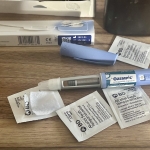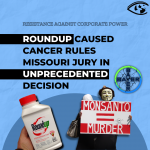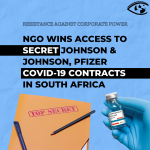Grey Market Drugs: Profiting from Poorly Managed U.S. Health Care
Ondis Eardensohn discovered a new and growing drug crisis first hand. On August 8, the former Plainfield postmistress drove two hours to New Hampshire's Dartmouth Hitchcock Hospital for an infusion of Doxil, one of the only remaining treatments for her stage-4 breast cancer. At the hospital, Eardensohn went through the usual tests, and was waiting for the infusion, when her doctor walked in. " I'm sorry,' he told me, but we don't have enough Doxil to treat you.' "
The Johnson and Johnson (J&J) drug is one of some 200 pharmaceuticals that critically ill people and hospitals are finding it hard to buy, sometimes, even if they are willing to pay grey-market prices that can soar many times higher than the regular price when supplies run short.
The problem is that major pharmaceutical companies today outsource much of their production to a vast $46 billion global contract-manufacturing industry. Scalpers on the gray market - unofficial, unauthorized middleman-companies, not unlike the people who sell concert tickets at many times their face value - often buy up supplies of key drugs from these contract manufacturers. They also keep track of supply and demand - not unlike commodity traders - and then take advantage of any changes to make quick profits.
"I drove home with no treatment. I was in shock," said Eardensohn, 59, a warm and resolutely optimistic mother of two. With an easy laugh and a soft ring of white curls grown in after the last round of chemo, Eardensohn does not fit the stereotypical image of a wasted cancer patient. But after 16 years of on-and-off radiation and chemotherapy treatments, she says: "I am not the same person I used to be. When you are at stage- 4, your options get more and more limited. If you have one option taken away, it may have been your last."
A week later, the hospital called her at home, where she lives with her partner of almost 30 years, state archivist Gregory Sanford. The major teaching institution still hadn't been able to buy any Doxil and was canceling her rescheduled appointment.
Relying on Sub-Contractors
There are been multiple reasons for drug shortages. "The largest percentage of current shortages is caused by domestic quality problems," says Mike Levy, the acting director of the Center for Drug Evaluation and Research (CDER), Drug Security, Integrity and Recalls at the U.S. Food and Drug Administration (FDA).
In addition, supply is impacted by lack of raw ingredients or substandard ingredients, just- in-time production, discontinuation of less lucrative products, and pay-to-delay sweetheart deals, under which companies, whose patent for a brand-name drug is about to run out, pay generics manufacturers not to produce a cheaper version.
But one of the key reasons that the supply has become so unpredictable is that even the major pharmaceutical companies no longer manufacture their own brand-name drugs.
For example in June, J&J had warned hospitals that no new patients could be started on Doxil, but claimed that old patients like Eardesohn would be given priority for the life-extending drug through a new program named C.A.R.E.S.
"There are some [old users] that are qualified, but haven't gotten Doxil," admits J&J spokesperson Monica Neufang. How many? The length of the "waiting list" is "proprietary," she said this summer, and J&J "wouldn't give that information to the FDA."
In November, Nuefang released some numbers: "Approximately 2,000 patients have been able to receive DOXIL through [C.A.R.E.S.], with approximately 2,500 patients on the wait list.
J&J insists that the Doxil shortage is not due to "quality, safety issues." Instead, Neufang blames "production delays." Then, in response to an earlier article, Neufang clarified, blaming "[e]quipment failures [that] require investigation and repair, sometimes resulting in the shut-down of entire production lines, which is the case for DOXIL.
In fact, it is not J&J that is doing the production. Although Doxil bears the J&J brand, it was outsourced and produced by Ben Venue Laboratories (BVL), an Ohio-based third-party contract manufacturer. BVL press materials also lay vague blame on "manufacturing capacity constraints."
A different explanation came from Health Canada, Canada's FDA counterpart. On August 17 the agency banned importation of some BVL drugs for "quality deficiencies" and what Health Canada spokesperson Olivia Caron calls "shortcomings in the Good Manufacturing Practices including product sterilization and quality oversight."
BVL spokesperson Jason Kutz said that concluding there was a link between the Canadian ban and quality issues was "inaccurate and misleading."
But within days of the Canadian action on August 17, and also facing restrictions on its products in Europe, BVL announced it was quitting contract-manufacturing. A division of Boehringer Ingelheim, headquartered in Germany with affiliates in more than 100 countries, BVL also produces for Pfizer, Takeda and Bristol- Myers Squibb.
Buying from the Grey Market
"Drug shortages have been a way of life for some time," says Vermont Health Department Commissioner Harry Chen. In the first six months of 2011, some 99.5 percent of hospitals reported at least one drug shortage, according to a June American Hospital Association (AHA) survey; 44 percent fell short on more than 20 drugs, and 78 percent rationed supply.
For example, Karen McBride, director of Pharmacy Services for Fletcher Allen Health Care, a university-affilliated Vermont hospital, says she has to scrounge drugs from other facilities and beg emergency rations from manufacturers. "On a weekly basis, we are making multiple phone calls. It's ten times more work than it used to be," she told CorpWatch. When the drugs are tracked down, she adds: "My buyer is on it like a junkyard dog."
Even then it can be touch and go. Several months back, when a patient needed a critical antibiotic, intravenous Bactrim, McBride "was still working the phones on a Friday night at 7:30," she said, "to ensure that the patient didn't have an interruption in supply. " She finally located the drug at another New England hospital four hours away, and arranged for a courier to drive it to Burlington.
The problem is escalating, and pharmacists all over the country "are scrambling and desperate," says Amanda Forster of Premier, a major hospital drug purchasing cooperative.
Five years ago the FDA reported only 55 drugs in short supply; by 2010, there were 178; and in 2011 there will be 350, Premier predicts. The majority are low-profit generics, but big name drugs are also affected. Hard-to-make sterile injectables such as anesthesias and chemotherapies are particularly hard hit.
"More than 80 percent of all affected drugs were generic injectable medications, meaning drugs without patent protection that generally treat acute disease. In fact, half of the generic injectable drugs sold in the United States were on the shortages list, according to a November report by the IMS Institute for Healthcare Informatics.
The AHA survey confirmed the extent of the problem with "82% of hospitals report[ing] they have delayed patient treatment as a result of a drug shortage, and more than half were not always able to provide the patient with the recommended treatment. Three out of four hospitals report rationing or implementing restrictions for drugs that are in short supply."
Shortages cost hospitals about $200 million a year. In addition to costs from staff time for tracking drugs treating side effects and price gouging on scarce drugs, the price of substitute medicines can be many times more than the standard treatment. Faced with a shortage the generic cancer treatment leucovorin at $7.41 a dose, Maryland oncologist Frederick Smith turned to a similar drug, Fusilev for $177 a dose, the Wall Street Journal reported.
But there is a deeper price: "adverse patient outcomes" including death. The AHA survey revealed that shortages have caused adverse patient outcomes at one in five facilities, while one third of physicians surveyed by the non-profit Institute for Safe Medication Practices knew of shortage-related adverse outcomes. The impact is "disquieting, the Institute for Safe Medication Practices reported, noting delayed surgeries, dosage errors, and interrupted drug studies, as well as deaths linked to the use of substitute antibiotics to which the patient's microbes were resistant.
"No patient care has been compromised at Fletcher Allen," says Bruce Leavitt, head of the Fletcher Allen's Pharmacy and Therapeutics Committee, because he says that alternatives to unavailable drugs are usually found.
Commissioner Chen is not so sure that this is an adequate solution. "For a significant portion of unavailable drugs, it's not as simple as just switching" medications," he says.
The Profiteers
These shortages represent profit-making opportunities to the grey-market price gougers -- a network of wholesalers, who operate outside normal pharmaceutical distribution channels, but for the most part, within the law. By monitoring trade and government websites, and other indicators, the grey marketers can anticipate the market in order to stockpile and hoard potentially scarce drugs.
One of the key factors that these companies track is drug recalls and plant closings. For example Teva and Hospira--two of the U.S.'s largest makers of generics, including key chemotherapies--closed factories because of "manufacturing problems." J&J units had to issue massive recalls, and the FDA placed three of its plants under consent decrees for persistent failures to meet quality standards.
Such news is music to ears of the grey market sellers. One company, Florida-based Atlantic Biologicals, recently emailed a Vermont pharmacy offering shortage drugs that "are AVAILABLE. Of course quantities are limited," it noted. Account executive Lisy Nicolas, who described herself as "***YOUR #1 GO-TO GIRL!" offered the pharmacies "service that will amaze you." The email concluded, without a hint of irony, "HAVE A JOY FILLED DAY!!!!" (Emphasis in original.)
Some drugs fetch more than others. The San Antonio Express- News reported an "astonishing markup of 6,213 percent," for the lifesaving leukemia drug Cytarabine, from a grey-market price faxed to pharmacists.
An Institute for Safe Medication Practices survey released in late August 2011 reported that some 52 percent of respondents had bought drugs on the gray market in the last two years. Price hikes in this grey market are estimated to average 650 percent , according to Premier.
For example, Dartmouth Hitchcock hospital has "been fairly successful in obtaining needed medications for our patients," spokesperson Rick Adams wrote in an email. "However, we have been forced at times to go to market to purchase some medications, and have been subject to gray market upcharges."
Fletcher Allen has rejected that route, says McBride. "We get daily solicitations from grey marketers by telephone fax and email, but we don't buy from them because we can't be assured of authenticity and integrity. Some are stolen or counterfeit, and there are ethical concerns about what they are doing: inflating the price hugely," she says, adding with a flash of outrage: "They are very shady, trying to capitalize on a bad situation. That is unethical. It's disgusting."
"If it's not illegal, someone should look into it," says Commissioner Chen. "It is certainly unconscionable to operate like that."
This is also potentially unsafe, since before reaching a hospital pharmacy, grey-market drugs "can pass through five or six brokers, getting repackaged, relabeled, and possibly stored under poor conditions," says Premier spokesperson Amanda Forster.
Side-Effects
Today Eardensohn is on a Doxil substitute, Eribulin, which she says "has more side effects for me, including increased fatigue and unwellness. And since I went off Doxil I have developed a cough, and there has been a slight progression of the disease in my lungs." She also has to make the 140-mile round trip to Dartmouth Hitchcock three times a month rather than the once-a-month regimen for Doxil.
Months after Eardenson was first denied Doxil, J&J spokesperson Neufang emailed an update: "While we work with our supplier to resolve production issues, DOXIL will be intermittently available during the next several months." But still only for continuing patients. And now that Eardensohn has switched drugs, she worries that she will be unable to return to Doxil, despite the fact that her cancer symptoms have risen under the alternate treatment.
Eardensohn wonders how the grey marketers are able to hoard essential drugs and conversely why hospitals and government agencies are not adequately prepared for shortages. "This thing horrifies me, and not just for me," she says. "This is a kind of healthcare rationing. Why hasn't something been done?"
Despite all the claims of shortages of supply and demand, the simple answer is that profit considerations are almost always a factor. "Corporations look at profit margins," says Fletcher Allen's Leavitt, "and if a generic or other drug is not profitable, it is not a priority."
J&J's Neufang told CorpWatch that "the DOXIL shortage is not driven by profit motive."
Analysts disagree. "Whether a company makes drugs or iPads, it has a mission to maximize profit," says Steven Kappel, who helped develop Vermont's proposed health care reform models. "The problems come when that goal diverges from what we believe is the public interest," says the head of Policy Integrity, a Vermont think tank that develops and evaluates health policy. "It raises major ethical issues when making profits conflicts with saving lives."
- 182 Health



